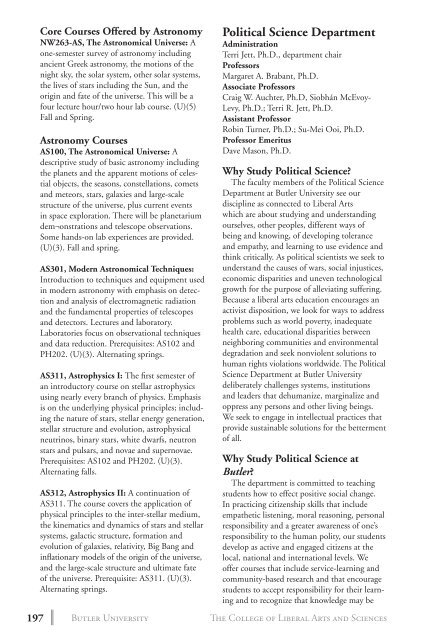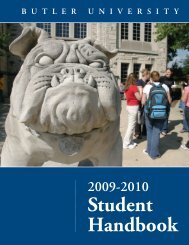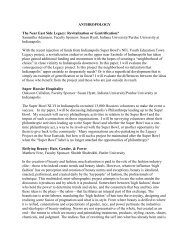2 0 1 3 bulletin - Butler University
2 0 1 3 bulletin - Butler University
2 0 1 3 bulletin - Butler University
You also want an ePaper? Increase the reach of your titles
YUMPU automatically turns print PDFs into web optimized ePapers that Google loves.
Core Courses Offered by Astronomy<br />
NW263-AS, The Astronomical Universe: A<br />
one-semester survey of astronomy including<br />
ancient Greek astronomy, the motions of the<br />
night sky, the solar system, other solar systems,<br />
the lives of stars including the Sun, and the<br />
origin and fate of the universe. This will be a<br />
four lecture hour/two hour lab course. (U)(5)<br />
Fall and Spring.<br />
Astronomy Courses<br />
AS100, The Astronomical Universe: A<br />
descriptive study of basic astronomy including<br />
the planets and the apparent motions of celestial<br />
objects, the seasons, constellations, comets<br />
and meteors, stars, galaxies and large-scale<br />
structure of the universe, plus current events<br />
in space exploration. There will be planetarium<br />
dem¬onstrations and telescope observations.<br />
Some hands-on lab experiences are provided.<br />
(U)(3). Fall and spring.<br />
AS301, Modern Astronomical Techniques:<br />
Introduction to techniques and equipment used<br />
in modern astronomy with emphasis on detection<br />
and analysis of electromagnetic radiation<br />
and the fundamental properties of telescopes<br />
and detectors. Lectures and laboratory.<br />
Laboratories focus on observational techniques<br />
and data reduction. Prerequisites: AS102 and<br />
PH202. (U)(3). Alternating springs.<br />
AS311, Astrophysics I: The first semester of<br />
an introductory course on stellar astrophysics<br />
using nearly every branch of physics. Emphasis<br />
is on the underlying physical principles; including<br />
the nature of stars, stellar energy generation,<br />
stellar structure and evolution, astrophysical<br />
neutrinos, binary stars, white dwarfs, neutron<br />
stars and pulsars, and novae and supernovae.<br />
Prerequisites: AS102 and PH202. (U)(3).<br />
Alternating falls.<br />
AS312, Astrophysics II: A continuation of<br />
AS311. The course covers the application of<br />
physical principles to the inter-stellar medium,<br />
the kinematics and dynamics of stars and stellar<br />
systems, galactic structure, formation and<br />
evolution of galaxies, relativity, Big Bang and<br />
inflationary models of the origin of the universe,<br />
and the large-scale structure and ultimate fate<br />
of the universe. Prerequisite: AS311. (U)(3).<br />
Alternating springs.<br />
Political Science Department<br />
Administration<br />
Terri Jett, Ph.D., department chair<br />
Professors<br />
Margaret A. Brabant, Ph.D.<br />
Associate Professors<br />
Craig W. Auchter, Ph.D, Siobhán McEvoy-<br />
Levy, Ph.D.; Terri R. Jett, Ph.D.<br />
Assistant Professor<br />
Robin Turner, Ph.D.; Su-Mei Ooi, Ph.D.<br />
Professor Emeritus<br />
Dave Mason, Ph.D.<br />
Why Study Political Science?<br />
The faculty members of the Political Science<br />
Department at <strong>Butler</strong> <strong>University</strong> see our<br />
discipline as connected to Liberal Arts<br />
which are about studying and understanding<br />
ourselves, other peoples, different ways of<br />
being and knowing, of developing tolerance<br />
and empathy, and learning to use evidence and<br />
think critically. As political scientists we seek to<br />
understand the causes of wars, social injustices,<br />
economic disparities and uneven technological<br />
growth for the purpose of alleviating suffering.<br />
Because a liberal arts education encourages an<br />
activist disposition, we look for ways to address<br />
problems such as world poverty, inadequate<br />
health care, educational disparities between<br />
neighboring communities and environmental<br />
degradation and seek nonviolent solutions to<br />
human rights violations worldwide. The Political<br />
Science Department at <strong>Butler</strong> <strong>University</strong><br />
deliberately challenges systems, institutions<br />
and leaders that dehumanize, marginalize and<br />
oppress any persons and other living beings.<br />
We seek to engage in intellectual practices that<br />
provide sustainable solutions for the betterment<br />
of all.<br />
Why Study Political Science at<br />
<strong>Butler</strong>?<br />
The department is committed to teaching<br />
students how to effect positive social change.<br />
In practicing citizenship skills that include<br />
empathetic listening, moral reasoning, personal<br />
responsibility and a greater awareness of one’s<br />
responsibility to the human polity, our students<br />
develop as active and engaged citizens at the<br />
local, national and international levels. We<br />
offer courses that include service-learning and<br />
community-based research and that encourage<br />
students to accept responsibility for their learning<br />
and to recognize that knowledge may be<br />
197 <strong>Butler</strong> <strong>University</strong><br />
The College of Liberal Arts and Sciences
















